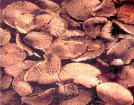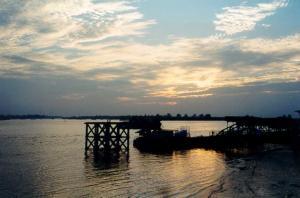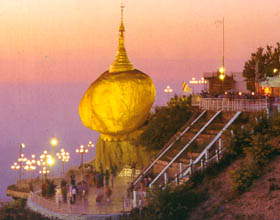 |
Travelogue Part 2, Burma
by Andrew Nickson
 |
Rangoon airport, only two people got off the plane. There are very few tourists about, which explains the best thing about Burma, the friendliness and genuine welcome of the people. Everyone says hello and is keen to talk. They don't care whether you buy anything or not, which is all very refreshing after tourist-saturated countries.
The bank gives 6 1/2 kyats to the dollar, the market offers 1000. Everything is cheap except stuff the government runs, such as trains, ferries, some hotels, and entrance fees to ruins/temples, where they gouge some 50 to 100 times the local price in dollars!
Never mind, my complaint is not the prices but the lack of infrastructure. The roads aren't any good, the trains and boats are ancient, creaky and slow, taking twelve hours by train to travel 180 kilometers. All very interesting blast-from-the-past travel, but you must have time and patience. Otherwise you can fly everywhere at over $100 per leg, sometimes $200. The locals earn less than $10 a month in government jobs (not the Army, though), and have to carry huge wads of notes to pay for things.
 |
The monks are very friendly, too, and very relaxed. They eat or take tea any time, buy lottery tickets, play pinball and the poker machines, and always have big grins on their faces. They chew betel, too, the national habit, spitting it out redly on the broken, potholed pavements. This is one reason why no one wears shoes this season, only thongs or sandals, it's too wet. There's beer at 50 cents a bottle, including spirulina beer (motto: the beer that actually makes you younger), gin/spirits at 10 cents a slug, and my favourite, palm wine. But the locals don't drink much, their big passions are tea, cigarettes and betel. When you sit down for a cup of tea or coffee, they bring trays of cakes and three or four cigarettes.
Rangoon is on a junction of two big rivers.You'll see 20 or 30 riverboats loading, waiting to leave at sunset. Low tide reveals great banks of thick grey mud.
 |
Since Burma once enjoyed the benefit of having been a British colony,
tea is taken on tiny 10 inch stools on the street, under big beach umbrellas
when it rains. You have to really scream at them to stop them from drowning
the tea in Happy Cow sweetened condensed milk, but they find one's antics
about this all very amusing. Other brands include "Godzilla"
mosquito coils, and most names start with "Golden," "Shwe"
in Burmese, even the pagodas start with Shwe, which makes sense as they
all are glittering gold topped with tinkling bells and the famous Burmese
rubies and emeralds.
At Moulmein I stayed in the master bedroom of a teak mansion built for
a 19th-Century British tea trader, now a guest house. My room was 25 by
30 feet with 20-foot ceilings, a huge tiled bathroom, windows facing the
river and islands with breakfast on the balcony...me as the great white
hunter taking rickshaws to the markets and honky tonk gin joints. Then
a six-hour boat trip upstream to Hpa-an, another ethnic capital on a river,
all coconut palms and deep, dark, rain-drenched rubber plantations with
white brahmin cows grazing inside and water buffalo up to their ears in
every mudhole...pagodas, pagodas and pagodas.
 |
The people smoke cheroots, which are cheaper than cigarettes. The women smoke them an inch thick. Their faces are daubed with musk-coloured dry paste for coolness, left on all day in spiral patterns. Men and women still wear the lunghi (a sarong), with wallets tucked openly in back. Luckily there is no petty theft or mugging (yet); it must be a true Buddhist influence. We take shelter from the sun under pith helmets, cane and bamboo.
Police and plain-clothes spies are everywhere, controlling everything, conscripting the youth and dominating the shattered economy (meaning they take over any successful business, so no incentive). Old pre-war Chevrolet trucks have been turned into uncomfortable buses...shades of Havana in this, same decaying Colonial grandeur among giant tropical trees.There's a spread of ancient temples on the Irrawaddy near Mandalay that rivals Cambodia's Angkor Wat ( called Bagan). There are mountain lakes, pagodas on all the hilltops, just lots of potential tourist stuff. The people are all SO delightfully friendly, smiles still truly genuine, and easy to talk to. They really make the place a dream destination despite the discomfort. But maybe in 20 years time people will return and say, " I've just come from Burma, gee, what a bunch of jerks..." THEN I'll know it's either time to die or go off and become a monk or something.
Copyright©EighthSquare.com P.O. Box 580, New York, NY 10113
